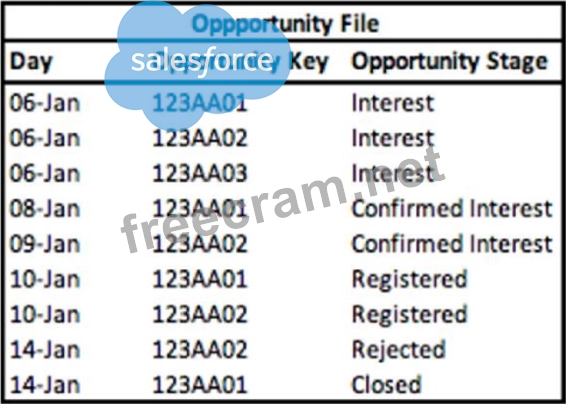<< Prev Question Next Question >>
Question 27/30
A technical architect is provided with the logic and Opportunity file shown below:
The opportunity status logic is as follows:
For the opportunity stages "Interest", "Confirmed Interest" and "Registered", the status should be "Open".
For the opportunity stage "Closed", the opportunity status should be closed Otherwise, return null for the opportunity status

Given the above file and logic and assuming that the file is mapped in a GENERIC data stream type with the following mapping:
"Day" - Standard "Day" field
"Opportunity Key" > Main Generic Entity Key
"Opportunity Stage" - Main Generic Entity Attribute
"Opportunity Count" - Generic Custom Metric
A pivot table was created to present the count of opportunities in each stage. The pivot table is filtered on Jan 11th. What is the number of opportunities in the Interest stage?
The opportunity status logic is as follows:
For the opportunity stages "Interest", "Confirmed Interest" and "Registered", the status should be "Open".
For the opportunity stage "Closed", the opportunity status should be closed Otherwise, return null for the opportunity status

Given the above file and logic and assuming that the file is mapped in a GENERIC data stream type with the following mapping:
"Day" - Standard "Day" field
"Opportunity Key" > Main Generic Entity Key
"Opportunity Stage" - Main Generic Entity Attribute
"Opportunity Count" - Generic Custom Metric
A pivot table was created to present the count of opportunities in each stage. The pivot table is filtered on Jan 11th. What is the number of opportunities in the Interest stage?


